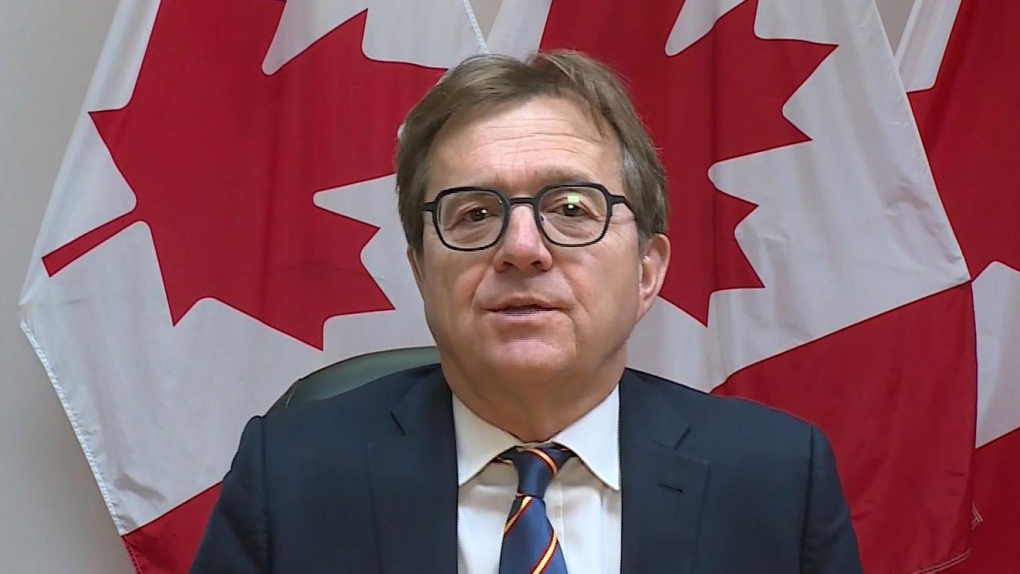Energy and Natural Resources Minister Jonathan Wilkinson said the federal government has “no interest” in subsidizing future liquefied natural gas (LNG) projects, including the electrification of ongoing projects.
In an interview with CTV Question Period host Vassie Kapelos that aired on Sunday, Wilkinson said such investments are up to the private sector.
“The government is opposed to spending government funds on inefficient fossil fuel subsidies. We are the first country in the world to actually do that. We have no interest in investing in LNG facilities. That’s the role of the private sector. They need to assess the business case and make the investment,” Wilkinson said.
The minister’s comments come days after Greek Prime Minister Kyriakos Mitsotakis exclusively told CTV Question Period that Greece is “of course” interested in buying Canadian LNG if the resources are available.
“We are a big entry point for LNG, not only for the Greek market, but also for the Balkans and Eastern Europe,” Mitsotakis said. “Theoretically, it could also be supplied to Ukraine.”
Asked whether Canada could be an ideal partner in that regard, Mitsotakis said: “Absolutely.”
“Canada is a country where we share many values,” he said, pointing to cooperation with Canada on several geopolitical issues, including Ukraine and the Israeli-Hamas war.
Germany and Japan have also expressed interest in purchasing Canadian LNG. But in August 2022, Prime Minister Justin Trudeau said he was not sold on the idea of exporting LNG as part of Canada’s long-term plan to become a reliable supplier of clean energy to Europe.
“In the short term, we are in a situation where we will do everything we can to contribute to the world’s energy supply by increasing production capacity. “We’ll look for ways to determine whether there is,” Trudeau said. “That would be by exporting LNG directly to Europe.”
There has been a long-standing political debate over whether Canada can and should plan to export to European countries in the future. LNG proponents argue that this energy source can play an important role in the drive towards a low-carbon future. But environmental critics worry that LNG expansion will prolong the use of fossil fuels.
On Thursday, New Brunswick Premier Blaine Higgs testified before a House of Commons committee, appealing to Ottawa for LNG exports to Europe to replace the federal carbon tax. Last year, Repsol decided against developing an LNG terminal in Saint John, citing the costs involved.
Wilkinson said New Brunswick can move forward on its own if it wants to ship LNG to Europe.
“Certainly, it’s possible that Premier Higgs, who has gas resources in New Brunswick, if he chooses to develop them, could look at developing a project that could actually transport LNG to Europe, but obviously that’s not new. “It’s going to have to be done in a way that’s consistent with Brunswick’s climate change plan,” Wilkinson said.
Future LNG projects will need to meet Canada’s 2030 climate goals, which include a goal to reduce oil and gas methane emissions by at least 75 per cent from 2012 levels by 2030. Mr Wilkinson said LNG production would need to rely on clean sources to meet reduction targets. electricity.
“A lot needs to be done to reduce upstream methane emissions and we are introducing regulations mandating 75 per cent reductions. “We can’t just burn natural gas and liquefy it; otherwise the carbon footprint is too large,” Wilkinson said.
When asked by Kapelos whether he was ideologically opposed to exporting LNG as a resource, Wilkinson pointed to projects underway in Western Canada, including projects that would address climate change. He reiterated the importance of
“We support efforts that can be made to replace heavy hydrocarbons, but only within a framework that respects and fits with the commitments we and other companies have made,” Wilkinson said. Stated.
According to Natural Resources Canada, there are currently eight LNG export projects “in various stages of development across Canada.” Shell-led LNG Canada, located in Kitimat, British Columbia, will become Canada’s first large-scale LNG export facility and aims to make first exports to Asian markets by 2025.
With files from CTV News Congressional Correspondent Spencer Van Dyke and CTV News Senior Digital Congressional Correspondent Rachel Aiello

